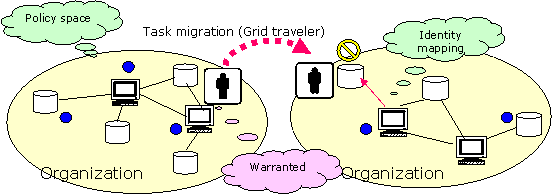G-JavaMPI Project
|
|
|
Figure 1: G-JavaMPI is a Grid Middleware with the Support of Java Process Migration. This project is supported by the China 863 Grid program - The HKU Grid Point project. |
Core members: Chen Lin, Ma Tianchi
Supervisors: Dr. Cho-Li Wang and Dr. Francis Lau
Project Description:
The computational grid is analogous to electric power grid. It allows to couple geographically distributed resources and offers consistent and inexpensive access to resources irrespective of their physical location or access point. The principal difference between grid computing and the other paradigms is that grid resources are typically not exclusively dedicated to the grid usage. These resources may reside in different domains, have different configurations, and be connected by networks with fluctuating bandwidth or even disconnected temporarily. All these characteristics demand the development of a special Grid middleware to support efficient Grid computing.
In this research, a new Grid middleware, named G-JavaMPI will be presented. This middleware extends the parallel computing capability of Java on the Grid with the support of a Grid-enabled message passing interface (MPICH-G2) for efficient communication between distributed Java processes. A special feature of G-JavaMPI is the support of transparent Java process migration for achieving global load balancing. In G-JavaMPI, the Java state capturing and restoring will be done through the standard Java Virtual Machine debugger interface (JVMDI). This makes it highly portable as it requires no modification of underlying OS or JVM. For achieving load balancing, we propose several communication-efficient process redistributing algorithms using the provided Java migration feature. All these algorithms consider communication costs based on the available network bandwidth between Grid points at run time. In particular, the decision of Java process migration will be made based on the prediction of future communication patterns of the target applications using bytecode parsing and execution tracing. The proposed G-JavaMPI middleware can help scientific or engineering applications adapt well to the dynamically changing network bandwidth and available computing resources in Grid, thereby, achieve higher performance.
Related Work:
Publication:
-
Lin Chen, Tianchi Ma, Cho-Li Wang, Francis C.M. Lau, and Shanping Li, ``G-JavaMPI: A Grid Middleware for Transparent MPI Task Migration,'' to appear in Engineering the Grid: Status and Perspective, Nova Science Publisher. (pdf)
-
Tianchi Ma, Lin Chen, Cho-Li Wang, and Francis C.M. Lau, ``G-PASS: Security Infrastructure for Grid Travelers, The International Workshop on Grid and Cooperative Computing (GCC 2004), pp. 301-308, Oct 21-24, 2004, Wuhan, China. (pdf)
-
Lin Chen, Cho-Li Wang, Francis C.M. Lau, and Ricky K. K. Ma, ``A Grid Middleware for Distributed Java Computing with MPI Binding and Process Migration Supports,’’ International Workshop on Grid and Cooperative Computing (GCC-2002), December 26-28, 2002, Hainan, China. (pdf)(PPT). A photo taken in GCC2002.
-
Lin Chen, Cho-Li Wang, and Francis C.M. Lau, ``A Grid Middleware for Distributed Java Computing with MPI Binding and Process Migration Supports,’’ Journal of Computer Science and Technology (China), Vol. 18, No. 4, July 2003, pp. 505-514.
-
Ricky K. K. Ma, Cho-Li Wang, and Francis C. M. Lau, ``M-JavaMPI : A Java-MPI Binding with Process Migration Support,'' The Second IEEE/ACM International Symposium on Cluster Computing and the Grid (CCGrid 2002), Berlin, Germany. (PAPER)(slide)
Last revised:
|
|
